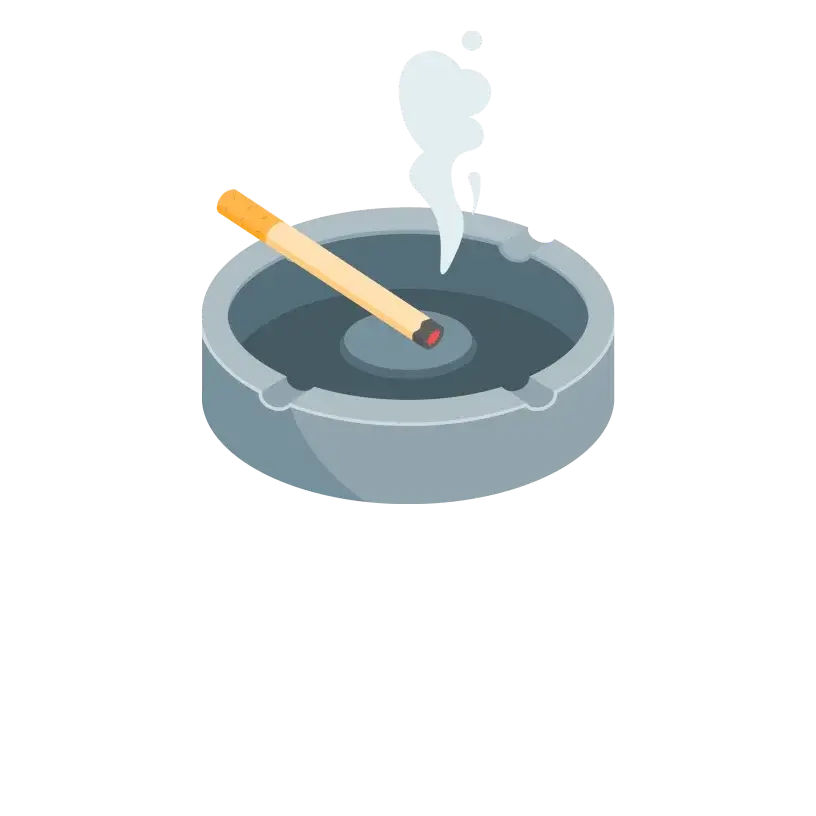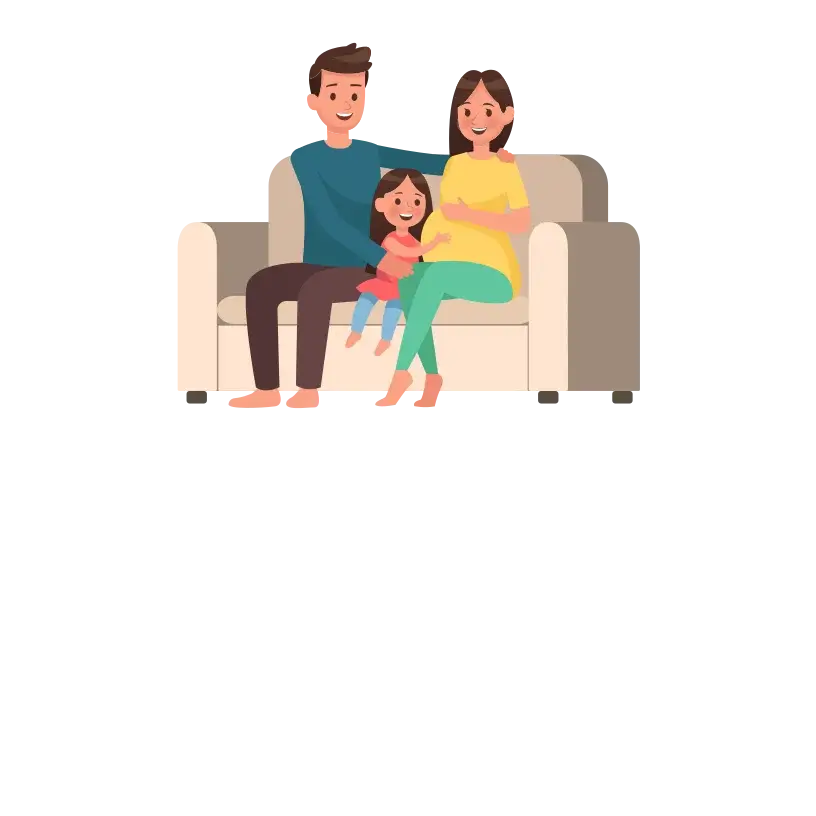Menu

Protecting your baby from harm is one the most beneficial actions you can take during pregnancy to provide your child with a healthy beginning in life. Smoking during pregnancy is extremely risky for both you and your baby.
According to Healthline, cigarettes contain harmful substances like nicotine, carbon monoxide, and tar, which can negatively affect the development of your baby and increase the likelihood of complications during pregnancy.
Secondhand smoke, or passive smoking, is also a concern. Babies whose mothers are exposed to other people’s tobacco smoke during pregnancy are at a higher risk of experiencing health issues.
Quitting smoking as early as possible is best, but even if you stop during the final weeks of your pregnancy, it will still have some positive effects on both you and your baby.
According to the NHS, quitting smoking will have immediate benefits for both you and your baby. Harmful substances like carbon monoxide and other damaging chemicals will begin to clear from your body.
Smoking while pregnant is harmful to both you and your baby. However, quitting smoking, even if you’re already pregnant, can significantly improve your baby’s health. If you smoke during pregnancy, you’re more likely to experience certain complications than non-smokers.
A study suggests that nicotine can induce contractions in the fallopian tubes, potentially obstructing the passage of an embryo. This could lead to an ectopic pregnancy, where the fertilised egg implants outside the uterus, typically in the fallopian tube or abdomen.
Ectopic pregnancies require immediate treatment to prevent life-threatening complications for the mother.
Smoking increases the risk of stillbirth, which is the loss of a baby before birth, typically after 20 weeks of pregnancy. Smoking affects the baby’s oxygen and nutrient supply, how well the placenta works, and can cause other problems that lead to the baby dying before birth.
Smoking during pregnancy can increase the risk of miscarriage, which is the loss of a pregnancy before the 20th week. The harmful chemicals in cigarettes can interfere with the development of the foetus and affect the health of the mother.
The placenta serves as the vital connection providing nutrients and oxygen to the foetus during pregnancy. Smoking significantly increases the risk of various placenta-related complications, including placental abruption.
This condition involves the premature separation of the placenta from the uterus before delivery, leading to severe bleeding and endangering the lives of both the mother and the baby.
Smoking increases the risk of placenta previa. Typically, during pregnancy, the placenta develops in the upper region of the uterus, leaving the cervix accessible for delivery.
However, with placenta previa, the placenta remains positioned in the lower part of the uterus, either partially or fully covering the cervix. This positioning can lead to placental tearing, resulting in significant bleeding and depriving the foetus of essential nutrients and oxygen.
Preterm labour is the onset of labour before 37 weeks of pregnancy. This premature onset of labour can result in the baby being born too early, which is known as premature birth. Babies born prematurely are at a higher risk of facing health complications both at birth and later in life compared to babies born at full term.
Smoking is also associated with the risk of delivering babies with low birth weight. If you smoke during pregnancy, your baby is more likely to have a low birth weight, which means they are born weighing less than 5 pounds and 8 ounces.
Smoking during pregnancy increases the likelihood of your baby being born with congenital abnormalities. The most prevalent issues include congenital heart defects and structural heart problems.
Additionally, smoking while pregnant has been associated with other health concerns such as cleft lip and cleft palate.
If you smoke during pregnancy, your baby is at a higher risk of dying from sudden infant death syndrome (SIDS). SIDS is the unexplained death of a baby under the age of 1, usually while the baby is sleeping. It’s also known as crib death.
A study suggests that nicotine can induce contractions in the fallopian tubes, potentially obstructing the passage of an embryo. This could lead to an ectopic pregnancy, where the fertilised egg implants outside the uterus, typically in the fallopian tube or abdomen.
Ectopic pregnancies require immediate treatment to prevent life-threatening complications for the mother.
Smoking increases the risk of stillbirth, which is the loss of a baby before birth, typically after 20 weeks of pregnancy. Smoking affects the baby’s oxygen and nutrient supply, how well the placenta works, and can cause other problems that lead to the baby dying before birth.
Smoking during pregnancy can increase the risk of miscarriage, which is the loss of a pregnancy before the 20th week. The harmful chemicals in cigarettes can interfere with the development of the foetus and affect the health of the mother.
The placenta serves as the vital connection providing nutrients and oxygen to the foetus during pregnancy. Smoking significantly increases the risk of various placenta-related complications, including placental abruption.
This condition involves the premature separation of the placenta from the uterus before delivery, leading to severe bleeding and endangering the lives of both the mother and the baby.
Smoking increases the risk of placenta previa. Typically, during pregnancy, the placenta develops in the upper region of the uterus, leaving the cervix accessible for delivery.
However, with placenta previa, the placenta remains positioned in the lower part of the uterus, either partially or fully covering the cervix. This positioning can lead to placental tearing, resulting in significant bleeding and depriving the foetus of essential nutrients and oxygen.
Preterm labour is the onset of labour before 37 weeks of pregnancy. This premature onset of labour can result in the baby being born too early, which is known as premature birth. Babies born prematurely are at a higher risk of facing health complications both at birth and later in life compared to babies born at full term.
Smoking is also associated with the risk of delivering babies with low birth weight. If you smoke during pregnancy, your baby is more likely to have a low birth weight, which means they are born weighing less than 5 pounds and 8 ounces.
Smoking during pregnancy increases the likelihood of your baby being born with congenital abnormalities. The most prevalent issues include congenital heart defects and structural heart problems.
Additionally, smoking while pregnant has been associated with other health concerns such as cleft lip and cleft palate.
If you smoke during pregnancy, your baby is at a higher risk of dying from sudden infant death syndrome (SIDS). SIDS is the unexplained death of a baby under the age of 1, usually while the baby is sleeping. It’s also known as crib death.
According to the March of Dimes “A maternal and infant health initiative”, creating a quit plan is an effective strategy to support your journey to stop smoking.
It’s a personalised roadmap that prepares you for quitting and boosts your chances of success in becoming smoke-free.
You can develop your plan by visiting smokefree.gov/build-your-quit-plan or writing it down. Here are some other things to include in your quit plan:

On your chosen quit day, dispose of all your cigarettes, cigars, lighters, and ashtrays. Pick a day within the next two weeks to allow yourself time to prepare. Mark this quit day on your calendar to remind yourself of your commitment to quitting smoking.

Your reasons for quitting smoking are your motivations and incentives to stop smoking. It’s important to identify and list these reasons as they serve as powerful reminders of why you’ve chosen to quit. When you feel the urge to smoke, referring to this list can help reinforce your determination and resolve to stay smoke-free.

Triggers are things that make you want to smoke, like feeling stressed or being in social gatherings. By identifying and understanding your triggers or what prompts your urge to smoke, you can identify healthier coping mechanisms or distractions to replace the habit.
This might involve finding alternative ways to cope with stress, changing routines associated with smoking, or avoiding situations where you’re likely to encounter triggers.

Dealing with cravings while quitting smoking involves finding alternative activities to distract yourself from the urge to smoke. One effective strategy is to engage in physical activity, such as going for a walk, to clear your mind and occupy your time.
Keeping your hands busy with a stress ball or engaging in needlework can also help redirect your focus away from smoking. Additionally, snacking on crunchy vegetables or chewing gum can satisfy the oral fixation associated with smoking and alleviate cravings.

To quit smoking, it’s important to remove anything that reminds you of smoking, like matches and ashtrays. This helps break the habit.
Also, wash your clothes and clean your car to eliminate the smell of smoke, which can trigger cravings. Creating a fresh, smoke-free environment makes it easier to stick to your plan and resist the urge to smoke.

Consult your healthcare provider about available resources that can assist you in quitting, such as nicotine patches, gum, nasal spray, or medications. Don’t start using these aids without the approval of your healthcare provider.
You can also utilise apps and quitlines to provide valuable support during your quit journey. Smokefree.gov offers a free text message program tailored for pregnant women trying to quit and a free app to help you stay on track.

Informing your family, friends, and loved ones about your decision to quit smoking is crucial as they can offer valuable support throughout your journey. By sharing your plan with them, you create a support network of individuals who can provide encouragement, understanding, and motivation when encountering challenges or cravings.

On your chosen quit day, dispose of all your cigarettes, cigars, lighters, and ashtrays. Pick a day within the next two weeks to allow yourself time to prepare. Mark this quit day on your calendar to remind yourself of your commitment to quitting smoking.

Your reasons for quitting smoking are your motivations and incentives to stop smoking. It’s important to identify and list these reasons as they serve as powerful reminders of why you’ve chosen to quit. When you feel the urge to smoke, referring to this list can help reinforce your determination and resolve to stay smoke-free.

Triggers are things that make you want to smoke, like feeling stressed or being in social gatherings. By identifying and understanding your triggers or what prompts your urge to smoke, you can identify healthier coping mechanisms or distractions to replace the habit.
This might involve finding alternative ways to cope with stress, changing routines associated with smoking, or avoiding situations where you’re likely to encounter triggers.

Dealing with cravings while quitting smoking involves finding alternative activities to distract yourself from the urge to smoke. One effective strategy is to engage in physical activity, such as going for a walk, to clear your mind and occupy your time.
Keeping your hands busy with a stress ball or engaging in needlework can also help redirect your focus away from smoking. Additionally, snacking on crunchy vegetables or chewing gum can satisfy the oral fixation associated with smoking and alleviate cravings.

To quit smoking, it’s important to remove anything that reminds you of smoking, like matches and ashtrays. This helps break the habit.
Also, wash your clothes and clean your car to eliminate the smell of smoke, which can trigger cravings. Creating a fresh, smoke-free environment makes it easier to stick to your plan and resist the urge to smoke.

Consult your healthcare provider about available resources that can assist you in quitting, such as nicotine patches, gum, nasal spray, or medications. Don’t start using these aids without the approval of your healthcare provider.
You can also utilise apps and quitlines to provide valuable support during your quit journey. Smokefree.gov offers a free text message program tailored for pregnant women trying to quit and a free app to help you stay on track.

Informing your family, friends, and loved ones about your decision to quit smoking is crucial as they can offer valuable support throughout your journey.
By sharing your plan with them, you create a support network of individuals who can provide encouragement, understanding, and motivation when encountering challenges or cravings.
Secondhand smoke, also known as passive smoke or environmental tobacco smoke, is the mix of smoke from a burning cigarette and the smoke breathed out by a smoker.
Interestingly, the smoke produced from the burning end of a cigarette or cigar contains a higher concentration of harmful substances (such as tar, carbon monoxide, and nicotine, among others) compared to the smoke inhaled by the smoker.
It’s important to note that there is no safe level of exposure to secondhand smoke while pregnant. It increases the chances of having a stillbirth, a low-birth-weight baby, a baby with congenital disabilities, or other pregnancy problems.
According to WebMD, Maternal exposure to secondhand smoke can also lead to the development of various issues in babies and children, such as
Smoke can easily travel through vents and under doors, even in small amounts. Brief exposure to smoke can also exacerbate breathing problems for pregnant moms and their unborn child.
To minimise your exposure to secondhand smoke while you’re pregnant and after your baby is born, consider taking the following precautions:
According to Medical News today, Smoking during pregnancy can lead to various health complications for both the mother and the baby. If you experience new or unusual symptoms, it’s important to consult a doctor for guidance and proper evaluation.
Smoking at any point during pregnancy poses risks to both you and your baby’s health. Quitting smoking is the most beneficial action you can take for both of you. Here are some common myths about quitting smoking during pregnancy.
Fact: Quitting smoking at any point during pregnancy offers significant health benefits for both you and your baby. Within one day of quitting, your baby receives more oxygen, crucial for developing healthy lungs. Quitting smoking also reduces the risk of having a baby with low birth weight.
Fact: Quitting smoking doesn’t add extra stress to your baby. It’s one of the most beneficial actions you can take for your health and your baby’s well-being during pregnancy and after birth.
By quitting smoking now, you’ll shield your infant from the hazards of secondhand smoke and decrease the risk of sudden infant death syndrome (SIDS).
Fact: There is no safe level of smoking during pregnancy. Every puff of a cigarette releases harmful chemicals that can harm both you and your baby’s health.
Similarly, e-cigarettes are not harmless, and pregnant women should avoid using them. While there is still ongoing research on e-cigarettes, it’s known that the nicotine they contain can be harmful to developing babies.
Fact: While smoking may provide a temporary sense of calmness, it ultimately harms your body more than it benefits. The relaxation is short-lived, and the underlying causes of your stress are likely to persist. Smoking accelerates your heart rate, raises your blood pressure, and elevates carbon monoxide levels in your bloodstream, resulting in reduced oxygen supply to your baby.
Therefore, its negative effects on your health and your baby’s well-being far outweigh any perceived benefits.
Fact: Each time you smoke during pregnancy, you put your baby’s health at risk. Even if you smoked during a previous pregnancy and had a healthy baby, it doesn’t guarantee the same outcome for your next pregnancy. Every pregnancy is unique, and smoking increases the risk of complications regardless of past experiences.
Fact: The American Academy of Pediatrics advises mothers who smoke to try quitting but states that they can still breastfeed their baby if they continue to smoke. Breast milk offers essential nutrients for healthy growth and development.
To protect your baby from nicotine and secondhand smoke, it’s crucial to refrain from smoking while breastfeeding, wait until after breastfeeding to smoke, and maintain smoke-free environments in your car and home.
Fact: Quitting smoking at any point during pregnancy offers significant health benefits for both you and your baby. Within one day of quitting, your baby receives more oxygen, crucial for developing healthy lungs. Quitting smoking also reduces the risk of having a baby with low birth weight.
Fact: Quitting smoking doesn’t add extra stress to your baby. It’s one of the most beneficial actions you can take for your health and your baby’s well-being during pregnancy and after birth.
By quitting smoking now, you’ll shield your infant from the hazards of secondhand smoke and decrease the risk of sudden infant death syndrome (SIDS).
Fact: There is no safe level of smoking during pregnancy. Every puff of a cigarette releases harmful chemicals that can harm both you and your baby’s health.
Similarly, e-cigarettes are not harmless, and pregnant women should avoid using them. While there is still ongoing research on e-cigarettes, it’s known that the nicotine they contain can be harmful to developing babies.
Fact: While smoking may provide a temporary sense of calmness, it ultimately harms your body more than it benefits. The relaxation is short-lived, and the underlying causes of your stress are likely to persist. Smoking accelerates your heart rate, raises your blood pressure, and elevates carbon monoxide levels in your bloodstream, resulting in reduced oxygen supply to your baby.
Therefore, its negative effects on your health and your baby’s well-being far outweigh any perceived benefits.
Fact: Each time you smoke during pregnancy, you put your baby’s health at risk. Even if you smoked during a previous pregnancy and had a healthy baby, it doesn’t guarantee the same outcome for your next pregnancy. Every pregnancy is unique, and smoking increases the risk of complications regardless of past experiences.
Fact: The American Academy of Pediatrics advises mothers who smoke to try quitting but states that they can still breastfeed their baby if they continue to smoke. Breast milk offers essential nutrients for healthy growth and development.
To protect your baby from nicotine and secondhand smoke, it’s crucial to refrain from smoking while breastfeeding, wait until after breastfeeding to smoke, and maintain smoke-free environments in your car and home.
Within days of quitting smoking, you’ll begin to experience the benefits of not smoking. Within days of quitting, both your and your baby’s heartbeats return to normal, reducing the risk of breathing problems for your baby.
However, you may experience withdrawal symptoms because your body is accustomed to nicotine, the addictive substance in cigarettes. These symptoms can include cravings, irritability, increased appetite, coughing, headaches, or difficulty concentrating. While these symptoms may be challenging, they are temporary and typically peak within the first 10-14 days after quitting.
Remember to stay in control and focus on your reasons for quitting. Recognize that these symptoms signify your body healing and adjusting to life without cigarettes. It’s important to understand that withdrawal symptoms are easier to manage than the serious health conditions associated with smoking.
According to the March of Dimes “A maternal and infant health initiative”, E-cigarettes are not a safe alternative during pregnancy. They contain chemicals, including nicotine, which can harm both you and your baby.
Additionally, the flavours and other chemicals in e-cigarettes may pose risks to your health and the health of your baby. Breathing in vapour from someone else’s e-cigarette may also be harmful. If you’re pregnant and using e-cigarettes, it’s important to discuss quitting with your healthcare provider.
Smoking at any point during pregnancy can have harmful effects on both the individual and the foetus. Recent research from 2020 indicates that the most significant benefit is observed when someone quits smoking before reaching 15 weeks of pregnancy.
Quitting smoking before this point can reduce the risk of foetal growth restriction (FGR), a condition where the baby is born smaller than average.
It’s common to believe that smoking “light” or “mild” cigarettes is safer during pregnancy or to consider cutting down rather than quitting altogether. However, this is not the case; according to the March of Dimes , “A maternal and infant health initiative”, while reducing the amount of smoking may have some benefits, quitting smoking is the best choice for both you and your baby.
The sooner you quit smoking during pregnancy, the healthier both you and your baby can be. Ideally, quitting before becoming pregnant is optimal. However, quitting at any point during pregnancy can positively impact your baby’s health and well-being.
Nicotine gum and patches are designed to help smokers quit by releasing nicotine into the bloodstream, thereby reducing withdrawal symptoms and cravings. However, the safety of these nicotine replacement products hasn’t been thoroughly studied in pregnant women.
Experts advise that nicotine gum and patches should be considered for pregnant women only after other non-drug treatments, such as a counselling, have been attempted and failed. The decision to use nicotine replacement therapy during pregnancy should weigh the potential benefits of quitting smoking against the unknown risks associated with nicotine replacement and continued smoking.
Within days of quitting smoking, you’ll begin to experience the benefits of not smoking. Within days of quitting, both your and your baby’s heartbeats return to normal, reducing the risk of breathing problems for your baby.
However, you may experience withdrawal symptoms because your body is accustomed to nicotine, the addictive substance in cigarettes. These symptoms can include cravings, irritability, increased appetite, coughing, headaches, or difficulty concentrating. While these symptoms may be challenging, they are temporary and typically peak within the first 10-14 days after quitting.
Remember to stay in control and focus on your reasons for quitting. Recognize that these symptoms signify your body healing and adjusting to life without cigarettes. It’s important to understand that withdrawal symptoms are easier to manage than the serious health conditions associated with smoking.
According to the March of Dimes “A maternal and infant health initiative”, E-cigarettes are not a safe alternative during pregnancy. They contain chemicals, including nicotine, which can harm both you and your baby.
Additionally, the flavours and other chemicals in e-cigarettes may pose risks to your health and the health of your baby. Breathing in vapour from someone else’s e-cigarette may also be harmful. If you’re pregnant and using e-cigarettes, it’s important to discuss quitting with your healthcare provider.
Smoking at any point during pregnancy can have harmful effects on both the individual and the foetus. Recent research from 2020 indicates that the most significant benefit is observed when someone quits smoking before reaching 15 weeks of pregnancy.
Quitting smoking before this point can reduce the risk of foetal growth restriction (FGR), a condition where the baby is born smaller than average.
It’s common to believe that smoking “light” or “mild” cigarettes is safer during pregnancy or to consider cutting down rather than quitting altogether. However, this is not the case; according to the March of Dimes , “A maternal and infant health initiative”, while reducing the amount of smoking may have some benefits, quitting smoking is the best choice for both you and your baby.
The sooner you quit smoking during pregnancy, the healthier both you and your baby can be. Ideally, quitting before becoming pregnant is optimal. However, quitting at any point during pregnancy can positively impact your baby’s health and well-being.
Nicotine gum and patches are designed to help smokers quit by releasing nicotine into the bloodstream, thereby reducing withdrawal symptoms and cravings. However, the safety of these nicotine replacement products hasn’t been thoroughly studied in pregnant women.
Experts advise that nicotine gum and patches should be considered for pregnant women only after other non-drug treatments, such as a counselling, have been attempted and failed. The decision to use nicotine replacement therapy during pregnancy should weigh the potential benefits of quitting smoking against the unknown risks associated with nicotine replacement and continued smoking.
1. Andrew W. Horne, Jeremy K. Brown, Junko Nio-Kobayashi, Hazirah B. Z. Abidin, Zety E. H. A. Adin, Lyndsey Boswell, Stewart Burgess, Kai-Fai Lee, W. Colin Duncan. The Association between Smoking and Ectopic pregnancy: Why Nicotine is BAD for Your Fallopian Tube.
2. Chiolero, A., Bovet, P. and Paccaud, F., 2005. Association between maternal smoking and low birth weight in Switzerland: the EDEN study. Swiss medical weekly, 135(3536), pp.525-530.
3. Fleming, P. and Blair, P.S., 2007. Sudden infant death syndrome and parental smoking. Early human development, 83(11), pp.721-725.
4. Healthline. 8 Dangers of Smoking While Pregnant
5. March of Dimes. Smoking during pregnancy.
6. Marufu, T.C., Ahankari, A., Coleman, T. and Lewis, S., 2015. Maternal smoking and the risk of stillbirth: systematic review and meta-analysis. BMC public health, 15, pp.1-15.
7. Medical News Today. Smoking during pregnancy: Risks and how to quit.
8. NHS. Stop smoking in pregnancy.
9. Pineles, B.L., Park, E. and Samet, J.M., 2014. Systematic review and meta-analysis of miscarriage and maternal exposure to tobacco smoke during pregnancy. American journal of epidemiology, 179(7), pp.807-823.
10. Shobeiri, F. and Jenabi, E., 2017. Smoking and placenta previa: a meta-analysis. The journal of maternal-fetal & neonatal medicine, 30(24), pp.2985-2990.
11. Shobeiri, F., Masoumi, S.Z. and Jenabi, E., 2017. The association between maternal smoking and placenta abruption: a meta-analysis. The Journal of Maternal-Fetal & Neonatal Medicine, 30(16), pp.1963-1967.
12. Smoke free women. Myths: Smoking and Pregnancy.
13. The American College of Obstetricians and Gynecologists. Tobacco and Nicotine Cessation During Pregnancy.
14. WebMD. Smoking During Pregnancy.
© Mindsmaking 2024